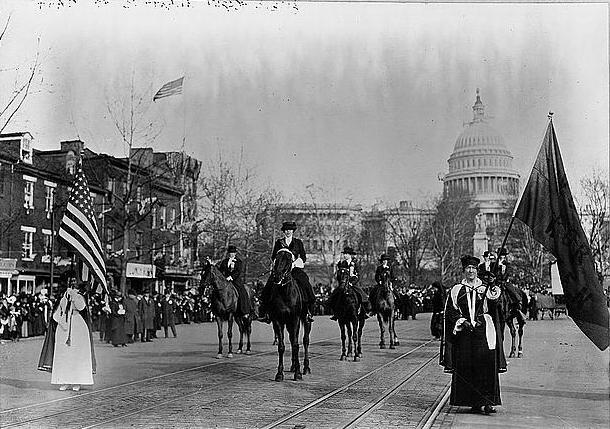
For International Women’s Day, ASPI suggests some thought-provoking reads and updates on women on the front lines of peace and security. We also offer a curated list of podcasts to fill your weekend and an award-winning documentary for your Saturday night.
This year’s IWD theme is #balanceforbetter. Have a look at 25 women changing the balance in international affairs with this list of young women to watch. ASPI’s Aakriti Bachhawat, Hannah Smith and Elise Thomas are on the list.
There are some great reads critiquing International Women’s Day. This ABC piece criticises the commercialism and resulting tokenism of IWD, reminding us how far the day has shifted from its revolutionary roots. This article highlights how far Australia still has to go to achieve gender parity, saying: ‘Women don’t need a pedestal for a single day, they need equality. Every day.’ These are important thoughts to keep in mind.
The world
New America has released The ‘consensual straitjacket’: four decades of women in nuclear security, which gives us a look into the experiences of women in nuclear security, arms control and non-proliferation policy. Catherine Killough, a nuclear policy analyst, discusses the second summit between US President Donald Trump and North Korean leader Kim Jong-un.
In light of the National People’s Congress in China, a woman’s right to choose is in focus as the declining birth rate there is expected to be on the agenda. Foreign Policy has published an interesting piece examining China’s current policy, arguing that even though the ‘one-child policy’ has been axed, the government still exerts control over wombs. Al Jazeera followed one woman’s quest to influence the situation and allow single women in China to access sperm donation.
On Thursday, the US State Department awarded the 2019 International Women of Courage Award to 10 recipients from around the world, including two amazing women fighting for the rights of the women of Myanmar, both inside and outside the country. Peace activist Naw K’nyaw Paw accepted the award on behalf of the Karen Women’s Organization, an ethnic women’s group with over 60,000 members. For more than 30 years, they have been fighting for the rights of ethnic minority women in Myanmar, including speaking out against the military and standing up for victims of sexual and gender-based violence.
Across the border in the Rohingya refugee camps in Bangladesh, fellow award recipient Razia Sultana has been fighting to make Rohingya women’s voices heard. She has interviewed hundreds of Rohingya refugee women and girls and published two reports, Witness to horror and Rape by command, documenting systematic sexual violence by Burmese security forces against the Rohingya.
Meanwhile, Chechnya appears to be presenting itself as an unexpected sanctuary for at least some women fleeing the territorial defeat of Islamic State. Chechen leader Ramzan Kadyrov, unlike some of his Western counterparts, is actively lobbying for the repatriation of women from Syria to Chechnya. The Chechen strongman is not exactly known for respecting either human rights or the rights of women, however, and his motives remain something of a mystery. Women fleeing from Chechnya and the North Caucasus more broadly face an uncertain future as they seek asylum in Poland.
Human Rights Watch is calling for protection to be provided to a planned IWD event in Ukraine. In previous years, far-right groups verbally and physically attacked people at the event. Last year, organiser Vitalina Koval suffered chemical burns after paint was thrown in her face by members of Karpatska Sich, a group also responsible for a range of other hate crimes against Roma and LGBT communities.
If you’re still looking for a present to celebrate International Women’s Day, The Oxford handbook of women, peace, and security was published last month. Its 67 chapters are full of cutting-edge and thought-provoking research and will be essential reading for peace practitioners and security nerds alike.
This week in history
On 3 March 1913, the first women’s suffrage parade in the United States took place in Washington DC. Almost 8,000 women marched and the parade was a catalyst for the women’s suffrage movement in the US. Seven years later, in 1920, American women received the right to vote.
Multimedia
Last week Period. End of sentence won the Academy Award for best short documentary. The film highlights the stigma related to menstruation in India and follows the story of a group of girls and women who have a pad vending machine installed in their village. The 25-minute film is well worth a watch and can be found on Netflix. In this interesting piece, Pallavi Pundir argues that the film is ‘unapologetically Western in its approach’ and ‘layered with a uni-dimensional lens, devoid of any understanding of the “menstrual politics” that have manifested in the social, religious and cultural structures of the country over the last few years’.
Podcasts
The latest episode of Seeking Peace explores the peace talks that ended the Troubles in Northern Ireland and hears from a young peace activist in Yemen.
Just in time for a weekend podcast binge, journalist Katy Cowan published this list of 13 insightful podcasts on women, feminism and gender equality. Number one (The Guilty Feminist) is sure to make you laugh!
Events
Later this month, ASPI’s Women in Defence and Security Network will be hosting speed mentoring evenings in Canberra on 14 March and Perth on 28 March. Make sure to book in early!